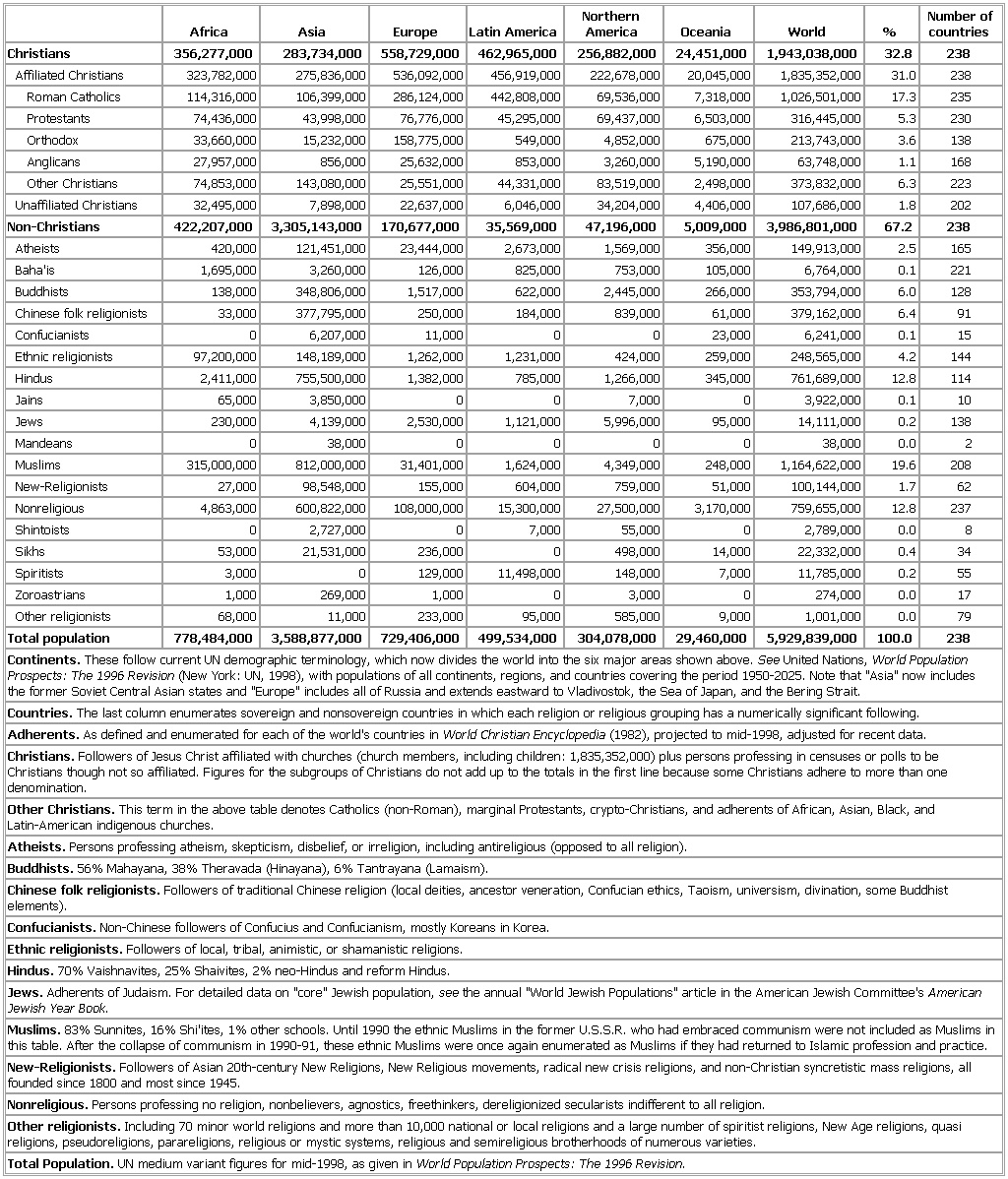- Worldwide Adherents of All Religions by Six Continental Areas, Mid-1998
-
▪ 1999countriesChristians 356,277,000 283,734,000 558,729,000 462,965,000 256,882,000 24,451,000 1,943,038,000 32.8 238Affiliated Christians 323,782,000 275,836,000 536,092,000 456,919,000 222,678,000 20,045,000 1,835,352,000 31.0 238Roman Catholics 114,316,000 106,399,000 286,124,000 442,808,000 69,536,000 7,318,000 1,026,501,000 17.3 235Protestants 74,436,000 43,998,000 76,776,000 45,295,000 69,437,000 6,503,000 316,445,000 5.3 230Orthodox 33,660,000 15,232,000 158,775,000 549,000 4,852,000 675,000 213,743,000 3.6 138Anglicans 27,957,000 856,000 25,632,000 853,000 3,260,000 5,190,000 63,748,000 1.1 168Other Christians 74,853,000 143,080,000 25,551,000 44,331,000 83,519,000 2,498,000 373,832,000 6.3 223Unaffiliated Christians 32,495,000 7,898,000 22,637,000 6,046,000 34,204,000 4,406,000 107,686,000 1.8 202Non-Christians 422,207,000 3,305,143,000 170,677,000 35,569,000 47,196,000 5,009,000 3,986,801,000 67.2 238Atheists 420,000 121,451,000 23,444,000 2,673,000 1,569,000 356,000 149,913,000 2.5 165Baha'is 1,695,000 3,260,000 126,000 825,000 753,000 105,000 6,764,000 0.1 221Buddhists 138,000 348,806,000 1,517,000 622,000 2,445,000 266,000 353,794,000 6.0 128Chinese folk religionists 33,000 377,795,000 250,000 184,000 839,000 61,000 379,162,000 6.4 91Confucianists 0 6,207,000 11,000 0 0 23,000 6,241,000 0.1 15Ethnic religionists 97,200,000 148,189,000 1,262,000 1,231,000 424,000 259,000 248,565,000 4.2 144Hindus 2,411,000 755,500,000 1,382,000 785,000 1,266,000 345,000 761,689,000 12.8 114Jains 65,000 3,850,000 0 0 7,000 0 3,922,000 0.1 10Jews 230,000 4,139,000 2,530,000 1,121,000 5,996,000 95,000 14,111,000 0.2 138Mandeans 0 38,000 0 0 0 0 38,000 0.0 2Muslims 315,000,000 812,000,000 31,401,000 1,624,000 4,349,000 248,000 1,164,622,000 19.6 208New-Religionists 27,000 98,548,000 155,000 604,000 759,000 51,000 100,144,000 1.7 62Nonreligious 4,863,000 600,822,000 108,000,000 15,300,000 27,500,000 3,170,000 759,655,000 12.8 237Shintoists 0 2,727,000 0 7,000 55,000 0 2,789,000 0.0 8Sikhs 53,000 21,531,000 236,000 0 498,000 14,000 22,332,000 0.4 34Spiritists 3,000 0 129,000 11,498,000 148,000 7,000 11,785,000 0.2 55Zoroastrians 1,000 269,000 1,000 0 3,000 0 274,000 0.0 17Other religionists 68,000 11,000 233,000 95,000 585,000 9,000 1,001,000 0.0 79Total population 778,484,000 3,588,877,000 729,406,000 499,534,000 304,078,000 29,460,000 5,929,839,000 100.0 238Continents. These follow current UN demographic terminology, which now divides the world into the six major areas shown above. See United Nations, World Population Prospects: The 1996 Revision (New York: UN, 1998), with populations of all continents, regions, and countries covering the period 1950-2025. Note that "Asia" now includes the former Soviet Central Asian states and "Europe" includes all of Russia and extends eastward to Vladivostok, the Sea of Japan, and the Bering Strait.Countries. The last column enumerates sovereign and nonsovereign countries in which each religion or religious grouping has a numerically significant following.Adherents. As defined and enumerated for each of the world's countries in World Christian Encyclopedia (1982), projected to mid-1998, adjusted for recent data.Christians. Followers of Jesus Christ affiliated with churches (church members, including children: 1,835,352,000) plus persons professing in censuses or polls to be Christians though not so affiliated. Figures for the subgroups of Christians do not add up to the totals in the first line because some Christians adhere to more than one denomination.Other Christians. This term in the above table denotes Catholics (non-Roman), marginal Protestants, crypto-Christians, and adherents of African, Asian, Black, and Latin-American indigenous churches.Atheists. Persons professing atheism, skepticism, disbelief, or irreligion, including antireligious (opposed to all religion).Chinese folk religionists. Followers of traditional Chinese religion (local deities, ancestor veneration, Confucian ethics, Taoism, universism, divination, some Buddhist elements).Confucianists. Non-Chinese followers of Confucius and Confucianism, mostly Koreans in Korea.Ethnic religionists. Followers of local, tribal, animistic, or shamanistic religions.Jews. Adherents of Judaism. For detailed data on "core" Jewish population, see the annual "World Jewish Populations" article in the American Jewish Committee's American Jewish Year Book.Muslims. 83% Sunnites, 16% Shi'ites, 1% other schools. Until 1990 the ethnic Muslims in the former U.S.S.R. who had embraced communism were not included as Muslims in this table. After the collapse of communism in 1990-91, these ethnic Muslims were once again enumerated as Muslims if they had returned to Islamic profession and practice.New-Religionists. Followers of Asian 20th-century New Religions, New Religious movements, radical new crisis religions, and non-Christian syncretistic mass religions, all founded since 1800 and most since 1945.Nonreligious. Persons professing no religion, nonbelievers, agnostics, freethinkers, dereligionized secularists indifferent to all religion.Other religionists. Including 70 minor world religions and more than 10,000 national or local religions and a large number of spiritist religions, New Age religions, quasi religions, pseudoreligions, parareligions, religious or mystic systems, religious and semireligious brotherhoods of numerous varieties.Total Population. UN medium variant figures for mid-1998, as given in World Population Prospects: The 1996 Revision.See as table:

* * *
Universalium. 2010.
